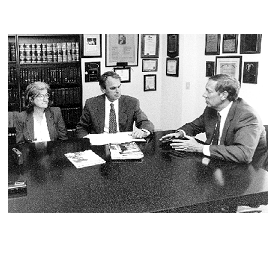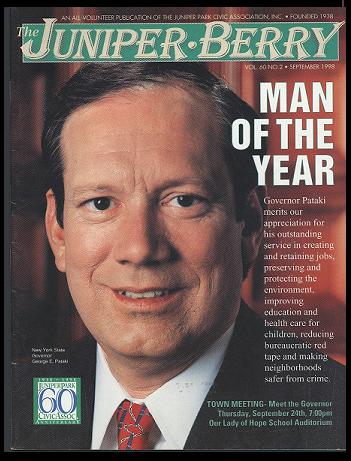At about 1:30 p.m. on Monday August 3, 1998, I received a telephone call from Robert Holden, President of the Juniper Park Civic Association. Mr. Holden invited me to join him for a meeting with Governor George Pataki, which was scheduled for 4:30 p.m. in the Governor’s mid-town offices. We arrived ahead of schedule and spent some time with the Governor’s gracious and attentive staff. We were ushered into a beautiful conference room, which had a gorgeous oval table as its centerpiece.
Very soon, a side door swung open and in walked the trim, athletic looking, six-feet- four-inches tall Governor of the State of New York. Mr. Pataki greeted us warmly and spent some time reviewing back issues of The Berry, which Mr. Holden brought along. The Governor expressed his admiration and amazement that our Juniper Park Civic Association could continue to produce this kind of Journal for sixty years.
Then for the next twenty minutes or so, Governor Pataki (GOV.) responded to a series of questions and community-related issues posed by Robert Holden (R.H.) and Margaret Magnus (M.M.).
R.H. Governor, what are your plans for tax reductions in the next four years?
GOV. We have to continue to reduce taxes, but the sad thing is that our taxes are still too high. We need to phase out estate tax in law. We plan to lower business tax, so that we can turn the economy around. We plan to get rid of sales tax on clothing up to $110, which will help all consumers. This will help keep shoppers in New York; will help create jobs; and most importantly, help families save money on their purchases. Public response to this has been fantastic. We are also in the process of implementing the Star Program to reduce school property taxes, and senior homeowners will see their school property taxes cut almost in half. We are going to continue to look across the board at consumer tax. My goal is every year to lead the nation in reducing taxes in New York State.
R.H. Our gasoline taxes appear to be among the highest in the nation. What can be done about this?
GOV It’s too high. We have lowered the petroleum and diesel fuel taxes, and I would be very supportive of any efforts to lower gasoline taxes. I am also supportive of anything that would reduce the cost of owning a car in NY state.
R.H. We are very concerned about pedestrians being struck and killed in our area. What do you see in the next few years that might correct what is being termed “road rage” and to prevent road accidents causing serious injuries and death?
GOV. We need to attack these issues on several fronts. (1) On an educational front, we need to make new young drivers aware that a license is not a right, but a privilege. And we are creating zero tolerance for alcohol abuse. They need to know that they will lose their license if there is even a trace of alcohol noted in their system. And we have to educate them as to the rules of the road and the importance of safety. (2) Enforcement of the laws. We can have all the laws in the world, but if we don’t enforce them, it doesn’t ultimately work, and that is why we are expanding our law enforcement efforts. We now have the road rage vans, not just to go after the criminally aggressive driver, but also to monitor situations so that we know where there is a disproportionate level of injuries or deaths. We can target those vans and move them in conjunction with the local police force. (3) Improving the safety of the roads and highways in a way that is consistent with the communities. To the extent that we can improve highways and get people off the local road, this makes for safer streets. And yet, we have to do it in a way that is consistent with the neighborhoods.
R.H. How do we get police to enforce traffic laws?
GOV. We will continue to work with local officials and the City Administration in urging officials to make these laws a priority.
M.M. How do you perceive the future of The City University of New York?
GOV. CUNY is an excellent system that is an important part of making New York what it is. But unfortunately, we were losing it . . . We were seeing, not just the junior colleges, but too many of the four-year senior colleges become places where what was being offered for too many students was just an advanced high school education. If you looked at institutions, like Queens College, and it is one of the finest academic institutions in America, they have an outstanding reputation and rightfully so. And we intend to invest more. We have a two billion dollar capital program to improve, upgrade, and expand the facilities of the City University system and at Queens College. And we will be doing that. But at the same time, we have every right to expect that the students who are going to those colleges are in fact performing at a college level. We are looking to end remediation in the more academically advanced CUNY colleges and focus it in the Community Colleges, in a way that works. It is just preposterous that someone can, not only attend, but attend for six or eight years and graduate from some of the CUNY institutions without really reaching a minimum level of competence. We are going to invest in the outstanding academic institutions, like Queens, to continue to make sure that they have the academic excellence that we expect from them. But we are also expecting more academically from the other CUNY colleges, as well as we should … In partnership with the Mayor … we are confident that the Trustees, in pushing higher academic standards, are doing the right thing. We are also confident that the State, in investing the $2B over the next few years and upgrading the system is doing the right thing.
R.H. I teach at New York Technical College in downtown Brooklyn. I believe that as a technical college we have been underfunded. What can be done?
GOV. Technical colleges are filling an enormous demand that help us not just with placement of students but help attract the companies to grow and expand here. And they have been enormously successful not just at City University, but at the State University system as well. Too often we’ve been preparing our college graduate for jobs that don’t exist and not preparing them for the tens of thousands of new jobs that are being created. We want the colleges to focus more on working with the outside business community, so that an on-going relationship exists.
R.H. I would like to ask about Jenna’s Law and further about dealing with violent criminals more harshly. This is very important to our Community and your initiatives are very important to us.
GOV. Last year, we were #1 in America, as a State, in reducing violent crime. We have to do more. To this Administration, it is very simple, when you commit a violent crime, you should be removed from people who obey the law for a very long time. Its been our trademark over the course of the last three and a half years. And we are going to continue to fight for those tougher laws, and for the end of parole for repeat violent felons, and now with Jenna’s law for ending parole for first-time violent felons. It’s going to save lives and improve the quality of life for our citizens. . . . And we are going to get to the root cause of crime—we are going to arrest the root cause of violent crime, and put those violent criminals behind bars for a very long time. We have to continue to fight to get passage of our juvenile justice package. We have to get passage of legislation to toughen the sanctions against people who would rape or prey on our children. And we will continue to fight every day for passage of tougher criminal justice laws. . . . We are going to continue to lead the nation in the reduction of violent crime. We are going to continue to fight until they give us the laws that will allow us to do that.
M.M. Prior to our meeting, Jack Irwin, Assistant to the Governor for Irish Affairs, told me that you had “Irish roots.” When are you going to Ireland?
GOV. Next Spring . . . I wanted to go this year and take my mother. Co. Louth is where my grandmother comes from. I just hope I can get over there next Spring.
Governor Pataki seemed eager to linger a little longer, but his helicopter was waiting to whisk him off to his next appointment in Albany. We said our good-byes and told him that we were looking forward to seeing him again on Thursday, September 24 (7:00 P.M.) at Our Lady of Hope auditorium. Be sure to get there early and hear for yourself what the Governor of the State of New York has to say.



